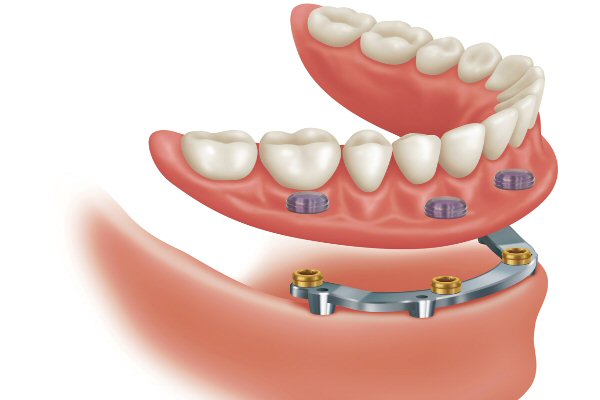Dentures
Over time, people’s teeth tend to naturally deteriorate. When a tooth has deteriorated substantially, it often needs to be extracted. And when multiple teeth are extracted, dentures may be the most appropriate solution. Dentures can create a natural and healthy-looking set of teeth. As well, a properly fitting set of dentures can greatly enhance your smile and sense of self-esteem.
Complete and Partial Dentures
Many types of dentures exist, including complete and partial dentures. Complete dentures are used when few of the original teeth remain. The dentist begins by removing any remaining teeth so the dentures can be fitted. He or she then makes a mold of the gums and sends it to a dental lab where customized dentures are constructed. Patients are typically fitted with temporary dentures until the permanent set of dentures have returned from the laboratory. Partial dentures are prepared in much the same way as a complete set and are utilized when only a few teeth are missing.

Overdentures
If the roots of a patient’s remaining teeth (the tissue and gums) are strong, the dentist may suggest overdentures. Overdentures fit on top of the remainder of the teeth in the mouth. With overdentures, the remaining teeth are resculpted and covered with metal caps to stop future decay. The advantage of over dentures is that they do not have to be relined as frequently as a complete set of dentures because the jawbone and gums recede less. In addition, overdentures create fewer occlusion (bite) problems than complete dentures.
Once Your Dentures Have Been Placed
At first, your dentures will feel uncomfortable because the gums and tissue are not accustomed to contact with man-made relining material. Once placed, patients should wear their dentures continually for the first few days to reduce the amount of swelling that may occur in the mouth. This swelling typically recedes in two to three days. Until patients become accustomed to their new set of teeth, the dentures may feel loose and awkward while chewing food. Eating soft food may also be necessary for the first few days. Reading aloud helps to overcome any speech impediments that may occur from the new dentures. Typically, lower dentures take longer to get used to than upper dentures. The underlying jawbone may take several months to completely heal and become accustomed to the dentures. Once this occurs, the dentist removes the dentures and creates a permanent lining for your teeth (a denture lining is a soft material that cushions the contact between the denture and the gum tissues).
The Life of your Dentures
Proper care and cleaning will increase the life of your dentures. Although they typically last five years, proper care and minimal jaw recession can extend the life of dentures up to 25 years. Dentures should be cleaned daily with a normal or specially-made denture toothpaste. Once the swelling has reduced, it is advisable to leave one or both dentures out at night to allow the gum tissues to breathe. In order to prevent dentures from warping, they should be left in water overnight. Over time, the lining of the dentures may change, owing to the wear and tear of daily use. In the case of tissue/bone shrinkage, worn down teeth, or breakage, dentures may come loose and need to be remade.
